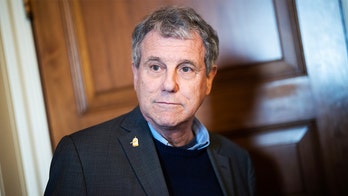Is Romney's business past a plus or minus for candidate?
James Rosen looks at frontrunner's record
You know you are living in unusual times – or at least a weird political cycle – when the Democratic National Committee, MoveOn.org, and AFL-CIO President Richard Trumka nod in solemn agreement with Republican presidential candidates like Newt Gingrich and Rick Perry. In this season of hyper-partisanship and polarizing debate, what could possibly unify these disparate characters and institutions (for now)?
It is the record amassed in the private sector by GOP presidential front-runner Mitt Romney, who served nearly 15 years as CEO of Boston-based Bain Capital before he won the Massachusetts governorship and later launched his two bids for the presidency.
Yet while Romney’s tenure at Bain has been subjected to some inaccurate and, some argue, downright dishonest attacks – Gingrich himself has asked the political action group that supports him, Winning Our Future, to stop running a film that uses numerous distortions to assail Romney’s business record – it is also true that the former Massachusetts governor has shifted his own claims about that record and thereby contributed to the confusion surrounding it.
When Romney first ran for political office, challenging Sen. Edward Kennedy in 1994, Romney’s ads claimed he had helped to build “more than 20 businesses” and helped to create “more than 10,000 jobs.” At the time, both major newspapers in the state, the Boston Globe and Boston Herald, essentially verified those claims, even though the Globe endorsed Kennedy.
“The review of Romney's business dealings,” the Globe editorialized in August 1994, “offers support, albeit with some qualifications, for the cornerstone of his campaign: his role in the creation of more than 10,000 jobs.”
“What is available through various sources,” echoed the Herald that November, “largely bears out Romney's claim that between 10,000 and 17,000 jobs were added to firms while Bain – during Romney's tenure there – held interests in the companies.”
In recent weeks, however, Romney has inflated the figures considerably. He now refers to having invested in about 100 companies during his tenure at Bain; this would mean that in the final five years of his fifteen-year run with the company, he quadrupled the number of businesses he helped build during the first 10. “We helped create over 100,000 new jobs,” he stated on “Fox and Friends” on Jan. 3. That figure the candidate arrives at by tallying all of the jobs added by companies that flourished under Bain’s stewardship when Romney was there, and by also counting the jobs those companies have added in the thirteen years since Romney left Bain.
“I've read some analysts who look at it and say that you're counting the jobs that were created but not counting the jobs that were taken away,” ABC News’ George Stephanopoulos asked Romney on Jan. 7. “Is that accurate?” “No, it's not accurate,” Romney countered. “It includes the net of both. I'm a good enough numbers guy to make sure I got both sides of that.”
More broadly, private equity professionals familiar with Bain, and with Romney’s record there, have rejected the portrait of him that both Democrats and some of Romney’s GOP rivals have sought to paint: an insatiably greedy corporate raider like Gordon Gekko from the movie "Wall Street," mercilessly acquiring companies for the sheer sport and profit of disassembling them, without a trace of concern for the trail of unemployed workers he leaves in his wake.
“If Governor Romney would like to give back all the money he's earned from bankrupting companies and laying off employees over his years at Bain, that I would be glad to then listen to him,” said Gingrich, the former House speaker, after a campaign stop in Londonderry, N.H., on Dec. 12.
“We need to have more venture capitalism in America and less vulture capitalism,” Perry, the Republican governor of Texas, agreed during a speech in Columbia, S.C., on Thursday.
“I've never heard of coming into a company and destroying it and firing the employees and making money. That defies common sense,” said G. Cabell Williams III, co-owner of Williams & Gallagher, a Washington-based private equity investment firm. “Bain, just like all the firms engaged in private equity, is paid for success. They're paid for improving companies. That's how they get compensated. And their compensation is directly related to the success that the company experiences. And not in all cases, but in most cases, it involves growing the company.”
A spokesman for Bain Capital told Fox News the company, which is headquartered in Boston’s famous John Hancock Building, operates close to a dozen offices worldwide and directly employs some 900 people. Including its venture capital and private equity deals, Bain has invested in 450 companies since its founding in 1984. The website for the privately held company discloses that it presently manages upwards of $60 billion in assets.
“You really can't survive in private equity without a positive reputation, and I would say Bain Capital has one of the best reputations in the country,” Williams added.
Romney served as a vice president of Bain’s predecessor firm, then moved to the newly formed Bain Capital as its first CEO in 1984. He left the firm in early 1999. The Boston Globe has reported that a $17 million investment fund over which Romney presided at Bain grew to $200 million. As late as 2006, Romney was still receiving up to $15 million annually from his compensation package at Bain. It is true that some companies failed and laid off their workers while under Bain’s ownership. But the success stories appear, on balance, to outnumber the failed firms.
An irony: Among those investors for whom Bain – and Romney – did very well, bringing a good return on their money, were the pension funds for public-sector employee unions. These are some of the people who will likely work hardest to defeat Romney, should he become the GOP nominee.





